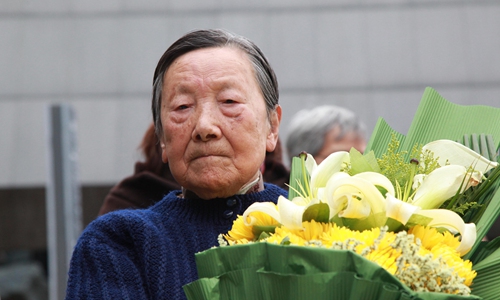HOME >> CHINA
Descendants of survivors bear testimony to history in Japan
Source:Global Times Published: 2019/12/12 21:03:40

Xia Shuqin, a survivor of the Nanjing Massacre, attends a memorial for the victims of the Nanjing Massacre in 2016. Photo: China News Service
Descendants of the survivors of the Nanjing Massacre attended a series of commemorative activities held by Japanese civil groups from December 7 to 11 in various Japanese cities including Osaka, Nagoya, and Tokyo, according to the Nanjing Morning News.The Japanese civil groups have held commemorative activities every year since 1997, which was the year that marked the 60th anniversary of the Nanjing Massacre. A total of 42 survivors had attended the activities, telling Japanese people personally about the dark days they had experienced.
As the survivors of the Nanjing Massacre have aged over the years, the responsibility of narrating the history has fallen on the shoulders of their descendants.
Ge Fengjin, son of Ge Daorong, a survivor of the Nanjing Massacre visited Japan to attend a hearing on December 6, the Xinhua News Agency reported.
Since 1994, a total of 55 descendants of the survivors of the Nanjing Massacre have attended hearings in Japan.
Ge Daorong witnessed his three uncles killed by the Japanese invaders in the winter of 1937. In order to protect his younger brother and younger sister, 10-year-old Ge Daorong was stabbed in his right leg.
"My father has never forgotten this event for the past 82 years," Ge Fengjin said. He said that the survivors wrote a book of more than 100,000 words recording his miserable experiences he encountered during that dark period in Nanjing and gave it to all of his family members.
In 2018, Ge Fengjin attended a seminar in Hiroshima, Japan that was themed on peace, and met with the descendants of the Japanese invaders.
"Although we have different identities, we share the same goal, which is safeguarding peace," said Ge Fengjin.
The descendants of Japanese invaders told him that they didn't know how to face the descendants of the victims, and hoped that there was something they could do to remedy the terrible experiences his father had to face.
From August 6 to 15, 1994, Xia Shuqin, a survivor of the Nanjing Massacre who was 64 years old at the time, traveled to Japan for testimony, becoming the first survivor of the Massacre to prove the crimes by Japanese troops.
From 1994 to 2015, a total of 55 survivors visited Japan to give their testimonies in 40 batches, said the Xinhua News Agency report.
Limited by physical conditions, these survivors can no longer bear traveling to Japan to give their testimonies. Therefore, more and more descendants of the survivors took over the responsibility from the previous generation.
Ge Fengjin said that he hopes the miserable experiences that his family suffered could help more Japanese youth know about the truth in history and know that peace is hard-won.
A PhD student surnamed Naito said that he would shed tears every time he attends the testimonies, and he feels sorry (for the Chinese people). Meanwhile, he is worried about those Japanese people who don't know about the true history and those who even attempt to tamper with the history and deny the existence of the Nanjing Massacre.
Naito has attended the testimonies of the Nanjing Massacre every year since 2015, and he said it's a precious opportunity to learn (the truth about history) in Japan.
Tanaka Hiroshi, an honorary professor at Hitotsubashi University, which is based in Tokyo, told the audiences at the testimony held on Wednesday that he hopes the testimonials can teach Japanese people about the history during those years, and let the future generations in Japan learn the truth.
Zhang Jianjun, head of the The Memorial Hall of the Victims in Nanjing Massacre by Japanese Invaders, told the Xinhua News Agency "We will continue sending descendants of the survivors to Japan for testimony together with experts and adhering to the campaign to spread history's truths," said Zhang.
RELATED ARTICLES:
Posted in: IN-DEPTH